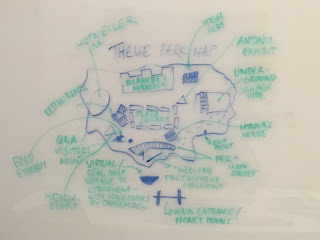Judical and Crime System in said society
To analyze in more detail: the Judical and Crime System is rather unusual in Cyrophena. First the criminals are judged in the their own respective territories. Usually the village chief or the villagers within the domain would decide which punishment to undergo before punishing the criminal. Since no killing is allowed in Cyrophena punishment is usually done by the following: cutting an arm, cutting a leg, hours of community service, or loss of property.
Usually standard crimes are decided within the tribe such as stealing (cutting off an arm or a leg), stalking (their eyes will be plunged out), fighting over property (the following parties are not to speak to each other for 2 months), impersonation or forging (fingers cut off and probably exiled to another tribe to do 5 years of community service before returning to the community). All of these crimes would usually be done in public (in front of children), so that even children would understand the severity of crimes. Some parents do try to hide their children from the violence, if that is the case the village elder would take the child out though (if they have not seen the ceremony at least once while they are seven) to see the punishment ceremony, and once they have completed the right, he will then swipe blood across the child's forehead as evidence (for those who did not see the ceremony) that they did see the ceremony.
It is because of this that there are often Rioters, who tend to be children under the age of 18, who go insane (either upon seeing the event), or after being so exposed to the violence, started to go insane mentally. Usually for those Rioters they are to be confined within their homes until these riot-like urges go away. Although some simply become traumatized for life and remain paralyzed. But for those who do survive undergoing the ceremony, they are officially recognized as one of the tribe's kin and thus (except nomads), belong to the community for life, unless a major crime is committed.
Within the village those who take care of the punishment usually include the village elder, and their punishment enforcers. Those who are punishment enforcers tend to be from other villages (they travel for a day or two for the punishment-trial), since each tribe leader is aware the enforcers should not be too attached to the tribe members or there would not be just treatment. This is due to an event from years ago in which a enforcer (a father) tried to free his daughter. It ended up terribly so as a precaution, the elders established this rule.
However, if there is a punishment in which the community is unable to decide upon, the specific tribe then schedules a meeting with the Herrians (the leader of all the tribes), and all 5 tribe leaders and their enforcers only are to attend this meeting and the punishment is then decided. Since killing is not allowed within Cyrophenian culture, the worse case scenario usually involves banishment to the desert (and the criminal being left to starve on his own), or slave labor at the mines for eternity.
Usually standard crimes are decided within the tribe such as stealing (cutting off an arm or a leg), stalking (their eyes will be plunged out), fighting over property (the following parties are not to speak to each other for 2 months), impersonation or forging (fingers cut off and probably exiled to another tribe to do 5 years of community service before returning to the community). All of these crimes would usually be done in public (in front of children), so that even children would understand the severity of crimes. Some parents do try to hide their children from the violence, if that is the case the village elder would take the child out though (if they have not seen the ceremony at least once while they are seven) to see the punishment ceremony, and once they have completed the right, he will then swipe blood across the child's forehead as evidence (for those who did not see the ceremony) that they did see the ceremony.
It is because of this that there are often Rioters, who tend to be children under the age of 18, who go insane (either upon seeing the event), or after being so exposed to the violence, started to go insane mentally. Usually for those Rioters they are to be confined within their homes until these riot-like urges go away. Although some simply become traumatized for life and remain paralyzed. But for those who do survive undergoing the ceremony, they are officially recognized as one of the tribe's kin and thus (except nomads), belong to the community for life, unless a major crime is committed.
Within the village those who take care of the punishment usually include the village elder, and their punishment enforcers. Those who are punishment enforcers tend to be from other villages (they travel for a day or two for the punishment-trial), since each tribe leader is aware the enforcers should not be too attached to the tribe members or there would not be just treatment. This is due to an event from years ago in which a enforcer (a father) tried to free his daughter. It ended up terribly so as a precaution, the elders established this rule.
However, if there is a punishment in which the community is unable to decide upon, the specific tribe then schedules a meeting with the Herrians (the leader of all the tribes), and all 5 tribe leaders and their enforcers only are to attend this meeting and the punishment is then decided. Since killing is not allowed within Cyrophenian culture, the worse case scenario usually involves banishment to the desert (and the criminal being left to starve on his own), or slave labor at the mines for eternity.

Comments
Post a Comment